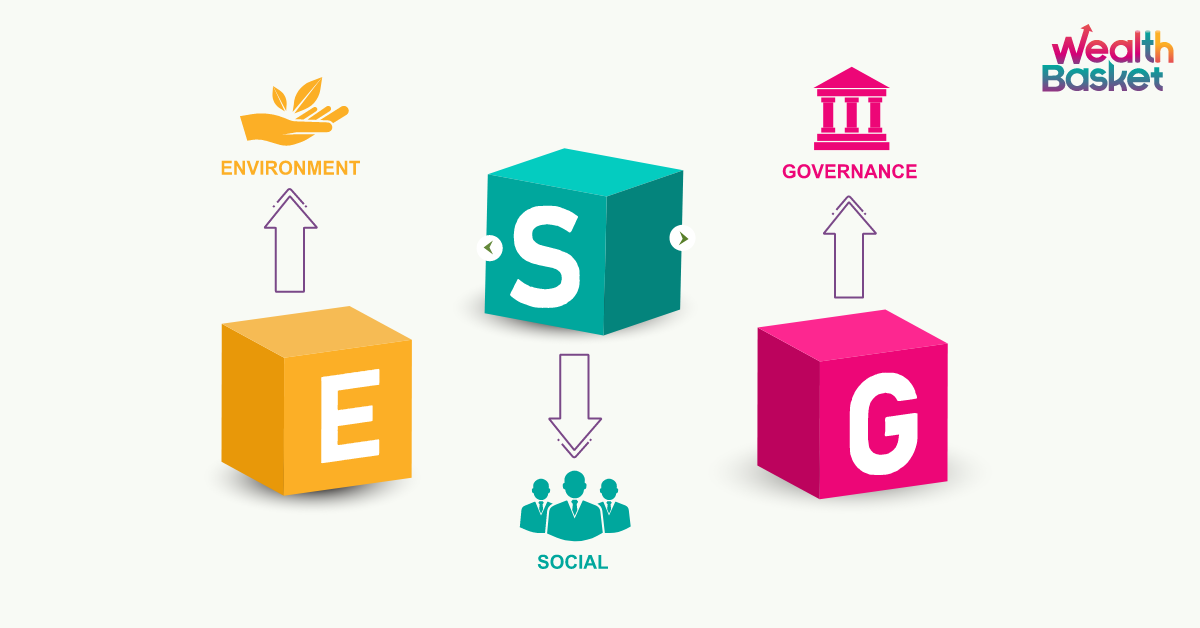The asset under management (AUM) of ESG funds in India reached ₹123 billion, i.e. almost five times the AUM from two years ago. If this number and ESG investing seem exciting, exploring this article may help as it talks about the meaning and parameters of ESG, the meaning of ESG stocks, the importance, advantages and challenges of ESG-based investing, and how to evaluate corporate ESG performance.
What Is ESG Investing?
ESG investing refers to an investment strategy that considers a company’s environmental, social and governance components in addition to financial returns.
Let’s understand ESG parameters in detail.
1. Environmental
In this, investors may look at the impact company have on the planet through
- Energy consumption
- Water consumption
- Greenhouse gas emission
- Renewable energy use
- Plastic and waste management
- Green products and technologies
- Green initiatives, etc.
2. Social
Some social factors that investors may look at include
- Safety policies for employees
- Employee benefits
- Customer service
- Customer complaints and corrective actions
- Consumer protection activities
- Public stance on social justice concerns, etc.
3. Governance
Governance is about how the company sticks to its policies, plans, ethics, etc. Here are some governance-related factors that investors may look at.
- Diversity in board and management group
- Possibility of conflict of interest
- Transparency
- Engagement with key stakeholders, etc.
What Are ESG Stocks?
Stocks belonging to companies that follow good corporate governance practices, behave environmentally conscious, create social impact, and address issues related to customers, employees and other stakeholders, are ESG stocks.
A few examples of ESG stocks in India are Havells India, Tata Power, Infosys, Godrej Consumer, Adani Enterprises, etc.
Why Is ESG Important?
Companies and their actions can considerably impact the environment and society. Therefore, ESG is becoming a long-term concern for businesses. With its growing importance, ESG is emerging as a crucial factor for companies’ financial growth.
The company’s ESG performance indicates how long the company will survive. Investors’ consideration of the company’s ESG performance as a crucial factor in investment decisions suggests the importance of ESG.
Advantages Of ESG Stocks
Contribution towards a sustainable world
The main goal of ESG-based investing is to motivate companies to maintain good governance practices and focus on resolving the world’s environmental and social issues. Thus, by investing in ESG stocks, investors may contribute their savings toward the world’s sustainability while earning returns.
Lower risk
If the company follows environmental, social and governance practices and acts responsibly, it may be less prone to reputation and regulatory risks. As a result, it may see lower volatility in cash flow and profitability even in unfavourable market conditions.
Potential for impressive returns
By acting proactively on sustainability, ESG stocks may offer greater returns over the long run, which may be higher than those who don’t follow these practices.
How To Evaluate Corporate ESG Performance?
Corporate reporting
The top 1000 listed companies (as per market capitalisation) in India have to prepare a Business Responsibility and Sustainability Report (BRSR) that includes detailed ESG disclosures. Other companies may voluntarily choose to disclose their ESG performance details. Usually, BRSR forms a part of the company’s annual report, which the company sends to the stock exchanges and shareholders and publishes on its official website.
Usually, companies state their ESG goals and currently achieved status in reports. Investors may carefully check and compare the ESG performance of companies, from their annual reports, over the years.
Third-party sources
Various ESG rating providers also collect companies’ data, analyse them and convert them to scores/ratings. Investors may look into the ratings to assess the ESG performance of companies. A few ESG rating providers in India include MSCI India, CRISIL, Acuite Ratings and Research, etc.
Risks Of ESG Investing
Lack of standard reporting framework
There is no standard method to measure and report the ESG performance of companies, making it more challenging for investors to compare and pick the right ESG stocks or funds.
Lack of reliable data
As there are no standard rules for ESG reporting, it may become tough for companies to recognise data to be published as a part of reporting. Businesses may also find it challenging to collect, compile and update ESG performance-related comprehensive quantitative data as some data are only available from external sources.
Final Thoughts
ESG stocks consider and attempt to address environmental, social and governance issues. Though the preference for ESG investing in India is growing, an old-school mindset, lack of proper understanding, lack of universally accepted standards, etc., are still some roadblocks. If done rightly, ESG investing may help to earn sustainable returns.
We, at WealthDesk, assist you in investing in WealthBaskets, which are the combinations of equities and ETFs that express an idea, theme, or strategy, and thus help you enjoy a rewarding investing journey. SEBI-registered professionals curate, monitor and manage these WealthBaskets.
FAQs
The three essential pillars of ESG are environmental, social and governance.
Looking at the stock’s ESG ratings and comparing them with peers may help to interpret ESG results. Usually, higher scores signal better ESG practices or lower ESG risks. However, it is important to understand the rating system of the concerned agency.
Many investors see ESG practices as long-term value-creation tools and make investment decisions after assessing the ESG practices of companies.
If you wish to earn returns on investments by supporting companies that follow practices that protect the environment and social welfare and have moral and ethical conduct, then ESG investing may be right for you.
Not all ESG stocks necessarily pay dividends; some do, while others don’t.
The growing preference for investing in ESG funds or ESG stocks suggests that it can be one of those factors that many investors would incorporate into their investment strategies in future.


















